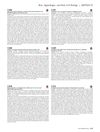 11 citations,
February 2018 in “Amino acids”
11 citations,
February 2018 in “Amino acids” Copper and iron cause keratin damage in hair by converting methionine to homocysteine.
146 citations,
September 2013 in “Advances in nutrition” Bariatric surgery can cause serious mineral deficiencies, requiring better patient education and monitoring.
July 2024 in “Vestnik dermatologii i venerologii” Post-COVID-19 hair loss is different from androgenetic alopecia and can be identified by lower copper and higher selenium levels.
 2 citations,
November 2023 in “Bioactive materials”
2 citations,
November 2023 in “Bioactive materials” New method improves copper peptide delivery for hair growth three times better than current options.
 2 citations,
March 2023 in “Frontiers in Bioengineering and Biotechnology”
2 citations,
March 2023 in “Frontiers in Bioengineering and Biotechnology” CuSi nanowires with NIR photothermal properties could effectively treat infected wounds and promote healing.
1 citations,
December 2022 in “Bioactive Materials” The microneedle patch with quercetin, zinc, and copper effectively promotes hair regrowth for androgenic alopecia.
 7 citations,
January 2017 in “Journal of cosmetology & trichology”
7 citations,
January 2017 in “Journal of cosmetology & trichology” Good nutrition is crucial for healthy hair and can help with hair loss without medication.
 April 2024 in “Materials today bio”
April 2024 in “Materials today bio” The CuCS/Cur wound dressing helps regenerate nerves and heal deep skin burns by rebuilding hair follicles.
 1 citations,
May 2022 in “Pharmaceutics”
1 citations,
May 2022 in “Pharmaceutics” Tea seed oil in nanostructured carriers stimulates hair growth and feels less greasy when applied.
 19 citations,
January 2019 in “International Journal of Trichology”
19 citations,
January 2019 in “International Journal of Trichology” Indian dermatologists recommend treating common hair loss with a balanced diet, stress reduction, mild shampoos, and sometimes minoxidil and supplements.
102 citations,
October 2010 in “Molecular Pharmaceutics” Copper-doxorubicin nanoparticles effectively treat tumors with less toxicity.
22 citations,
January 2017 in “Journal of steroid biochemistry and molecular biology/The Journal of steroid biochemistry and molecular biology” A new method accurately measures nine specific hormones in human blood.
 April 2018 in “The journal of investigative dermatology/Journal of investigative dermatology”
April 2018 in “The journal of investigative dermatology/Journal of investigative dermatology” Aging causes changes in scalp cells that can negatively affect hair health.
 April 2018 in “The journal of investigative dermatology/Journal of investigative dermatology”
April 2018 in “The journal of investigative dermatology/Journal of investigative dermatology” Researchers found a new way to isolate sweat glands from the scalp for study and culture.
 April 2018 in “The journal of investigative dermatology/Journal of investigative dermatology”
April 2018 in “The journal of investigative dermatology/Journal of investigative dermatology” GATA6 is important for maintaining and differentiating cells in a key area of human skin.

Adequate vitamin D might lower, and high hair chromium might increase DNA damage in obese women.
 February 2018 in “Egyptian Journal of Radiation Sciences and Applications”
February 2018 in “Egyptian Journal of Radiation Sciences and Applications” Patients with Discoid Lupus Erythematosus have lower vitamin D and antioxidant levels and higher oxidative stress.
 35 citations,
January 2006 in “Journal of Dermatological Treatment”
35 citations,
January 2006 in “Journal of Dermatological Treatment” Zinc can help with some skin problems, but its effectiveness varies depending on the condition.
 3 citations,
April 2021 in “Cureus”
3 citations,
April 2021 in “Cureus” Low Vitamin D is common in people with Alopecia Areata, but its impact on the condition needs more research.
 January 2021 in “Pediatric Oncall”
January 2021 in “Pediatric Oncall” Autoimmune hepatitis in children often affects girls and can be treated successfully with medication.
 1 citations,
February 2024 in “Environmental health perspectives”
1 citations,
February 2024 in “Environmental health perspectives” Exposure to certain metals may worsen attention-related behaviors in adolescents, with stronger effects in females.
 2 citations,
September 2017 in “Archives of Medical Science”
2 citations,
September 2017 in “Archives of Medical Science” Finasteride affects offspring's antioxidant enzymes in epididymis, possibly disrupting sperm maturation.
7 citations,
February 2017 in “Open veterinary journal” Tiger cubs fed artificial milk lacking certain amino acids developed eye problems and hair loss.
 3 citations,
January 2019 in “Elsevier eBooks”
3 citations,
January 2019 in “Elsevier eBooks” Pharmacists should interpret lab data and perform physical exams to improve patient care.
1 citations,
January 2020 in “Bioscience Reports” Long-term use of finasteride in women can cause hormonal changes, DNA damage, and menstrual issues.
 November 2020 in “Elsevier eBooks”
November 2020 in “Elsevier eBooks” Antiandrogens and androgen inhibitors like spironolactone, finasteride, and dutasteride can treat hair loss and skin conditions, but they have risks and side effects, including potential harm to pregnant women and risks of cancer and heart issues. Herbal remedies also have antiandrogenic effects but lack safety validation.
 August 2022 in “Journal of the American Academy of Dermatology”
August 2022 in “Journal of the American Academy of Dermatology” The authors agree they didn't discuss the risks of too much micronutrients and value the focus on biotin deficiency signs and treatment effectiveness.

The new gel with Zinc Oxide nanoparticles and finasteride shows promise for treating hair loss when applied to the skin.
8 citations,
January 2019 in “Turkish journal of medical sciences” Ischemic modified albumin could be a new indicator of oxidative stress in people with alopecia areata.
1 citations,
December 2019 Selenium is essential for health, but too much or too little can cause problems; blood selenium levels are a good measure of intake.





















